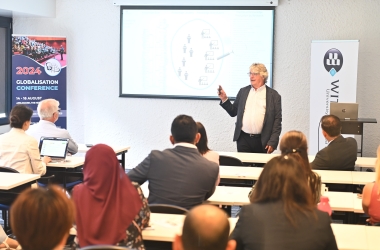Wittenborg Professor Coauthors Paper on Early Trust Development in Virtual Teams
Wittenborg Professor Coauthors Paper on Early Trust Development in Virtual Teams
Wittenborg Professor Coauthors Paper on Early Trust Development in Virtual Teams
Wittenborg professor Ad Kil recently coauthored the paper ‘Cultural Influences on Early Trust Development in Virtual Teams’ with three researchers from Nyenrode Business University: Ross Gardner, Robert Blomme and Nick van Dam. The work was published in Emerald Insight’s Management Research Review.

Ad Kil’s Study Focuses on the Potential Influence of Cultural Factors on Trust
Online, international and multicultural teams are becoming more prevalent in the business world. But how can trust be built when team members are often in different geographical locations with no opportunity for in-person interactions, and what role does national culture play in this process?
To better understand this phenomenon, Wittenborg professor Ad Kil recently coauthored the paper ‘Cultural influences on early trust development in virtual teams’. Published by Emerald Insight’s journal ‘Management Research Review’, the work is also coauthored by three researchers from Nyenrode Business University: Ross Gardner, Robert Blomme and Nick van Dam.
According to Kil, the authors were motivated to explore this topic because previous studies and theories on trust primarily focused on face-to-face interactions, overlooking virtual teams and the possible influence of team members’ diverse cultural backgrounds. “Therefore, this topic addresses both the virtualisation and globalisation that businesses are experiencing,” he points out.
The paper examines how national culture may influence the early development of trust through transference-based trust (TBT), which is shaped by referral sources, including word-of-mouth and both internal and external online information about team members. “We focused on the early development of trust. This is significantly different from knowledge-based trust, which is when people already know their colleagues well,” Kil explains.
Another factor considered by the researchers is institution-based trust, which refers to the confidence individuals have in an organisation. One of the authors’ hypotheses was that this kind of trust might be connected to the development of trust within virtual teams.
To collect data for their study, the authors administered a survey to international business students from two European countries, representing different nationalities, who were required to collaborate online during the COVID-19 pandemic. Among other topics, the questionnaire asked respondents about their faith in humanity, trust on other people, relationship with referral sources, ease of communication with other team members and consideration for the feelings of team members. In total, 357 usable responses were gathered.
“These students did not know each other; they answered the survey shortly before their team started working together. We already knew from other studies that, before virtual teams start collaborating, the minute people know the names of their colleagues, they start going to Google, Facebook or LinkedIn to find out information about them,” the professor underlines.
The study finds that cultural backgrounds are not so important when it comes to building trust in virtual teams. A bigger role is played in this process by individual factors such as people’s experiences, personal characteristics and the way they gather information.
Additionally, the research reaffirms the validity of cognitive-based trust models, built on factors such as the previous knowledge people have about each other and about their roles in the team. The paper also emphasises that referrals play an important role in building both interpersonal and institutional trust. “If someone is part of a prestigious organisation, this might cause you to trust them more. Conversely, if they are part of a company with an awful reputation, this will likely diminish the level of trust,” Kil comments.
The professor underscores that to positively influence interpersonal and organisational aspects of trust development, managers should ensure that the early phases of virtual teams, before actual implementation begins, are well-organised.
“Furthermore, the results of the study show that people need to maintain and actively manage their online presence, ensuring that online information about them is accurate and updated. Nowadays, an individual’s online presence is widely available, and may actually influence trust development. This information could help virtual team members learn about one another, which might in turn help foster early trust in their online teams,” he concludes.
WUP 15/01/2024
by Ulisses Sawczuk
©WUAS Press
685 words